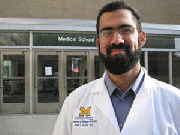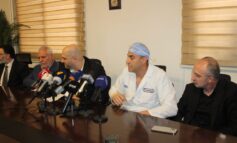
|
| Aasim I. Padela, M.D. |
Previous studies show health systems have established partnerships with priests and rabbis to improve Christian and Jewish health, and included these religious leaders in hospital chaplaincy programs.
But few imams, the Muslim religious leaders who hold various roles within the community, are included in these initiatives, says Aasim I. Padela, M.D., an emergency physician, instructor in the U-M Department of Emergency Medicine and Robert Wood Johnson Foundation Clinical Scholar at the U-M Health System.
“Imams play key roles in American Muslim community health and partnerships with them may be a means to improve community health and deliver culturally sensitive, high quality care to American Muslims,” says Padela.
The research appears online ahead of print publication in the Journal of Religion and Health.
Padela and his colleagues interviewed 12 Muslim community leaders in southeast Michigan, including two imams, to see how each perceives the imam’s role in community health.
Participants identified four central roles:
• Encouraging healthy behaviors through scripture-based messages in sermons
• Performing religious rituals around life events and illnesses
• Advocating for Muslim patients and delivering cultural sensitivity training in hospitals
• Assisting Muslims in health care decisions.
But researchers say several barriers, such as hospitals’ required chaplaincy credentials and imams’ lack of availability, could prevent partnerships between imams and health care systems.
Padela says future research should focus on gaining views from multiple communities and a larger cross-section of individuals to gauge the depth and generalizability of the study’s findings.g
Additional authors: Amal Killawi of U-M; Michele Heisler, M.D., M.P.H., of U-M and the VA Ann Arbor Healthcare System; Sonya DeMonner, M.P.H., of the VA Ann Arbor Healthcare System; and Michael D. Fetters, M.D., M.P.H., M.A., of U-M.
SOURCE: UMHS NEWSROOM






Leave a Reply